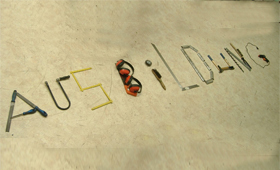Starting off the new year of training with 17 updated training occupations
BIBB President Esser: “Economy 4.0 will change job descriptions”
30/2015 | Bonn, 22.07.2015

From “apparel sewer” to “works fireman or woman” - the new year of training starts officially on 1 August with 17 updated dual training occupations. Once again this year more than half a million young people will start their new professional life with their training contract in their pocket.
“The high number of updated training occupations shows just how dynamic and flexible our dual training system is” underlined Friedrich Hubert Esser, President of the Federal Institute for Vocational Education and Training (BIBB). “This ensures both Germany's innovative capability and competitiveness as a location for business.” Young people and young adults are provided with practical qualifications which are relevant to the job market and are in demand from business, and they are also presented with attractive employment opportunities.
Esser added that the vocational education and training system is facing major challenges from the digitalisation of the world of work: “Economy 4.0 will change job descriptions and will certainly also require new occupations. I see this as a great opportunity to organise dual vocational education and training in a more attractive manner. In this respect, the BIBB will drive forward the updating of training occupations in the coming years with even greater commitment.” A preliminary investigation into a possible reorganisation of IT occupations in currently under way.
Overall, 17 updated training occupations come into effect at the start of the new year of training on 1 August 2015:
- Dispensing and game machine specialist
- Precast concrete parts worker
- Bow maker
- Leather production and tanning technology specialist
- Violin maker
- Foundry mechanic
- Wood mechanic
- Candle manufacturer and wax sculptor
- Notary assistant
- Maker of orthopaedic footwear
- Patent legal assistant
- Legal and notary assistant
- Legal assistant
- Textile and apparel sewer
- Textile and apparel tailor
- Works fireman or woman
- Cast stone and terrazzo maker
In total, young people and young adults can select from a total of 328 recognised dual training occupations. The adaptability of the dual vocational education and training in Germany is illustrated by the fact that, together with social partners and experts from company practice, the BIBB has revised a total of 234 training regulations on behalf of the Federal Government and updated these for the current economic, technical and societal requirements. This involved updating 197 training regulations and creating 37 training occupations from new. In 2014, approximately 39,300 new training contracts were concluded in just the nine training occupations which had been updated over the previous year.
The BIBB is currently working on the updating of 14 further training regulations which are likely to come into force at the start of the 2016 year of training. These include for example, roofer, hearing aid audiologist and sales assistant for retail services. As with all reorganisation or modernisation procedures, the framework curriculum required for the school section of the dual education and training is revised by the Standing Conference of the Ministers of Education and Cultural Affairs of the states in the Federal Republic of Germany (KMK).
The Federal Institute for Vocational Education and Training is also training its own staff. From the start of the new 2015 year of training, 35 trainees are being trained in five occupations (office management assistant, event manager, specialist in market and social research, specialist in media and information services, information technology specialist.) Eleven young people and young adults are therefore starting their new professional life in the BIBB. In addition to this, the BIBB is intensifying its activities in the area of “inclusion”. The institute has also been offering “integrated education and training with vocational training centres for disabled young people” in cooperation with the centre for the promotion of vocational training in Neuwied. The aim of the integrated education and training is to increase the chances of integration for trainees with disabilities.
Specimen copy requested if printed.